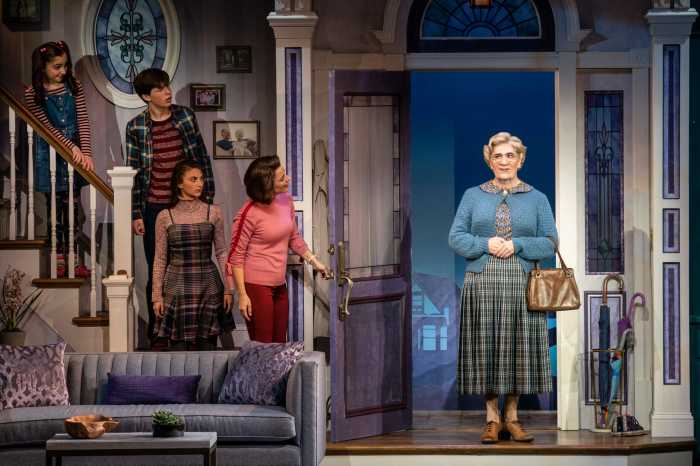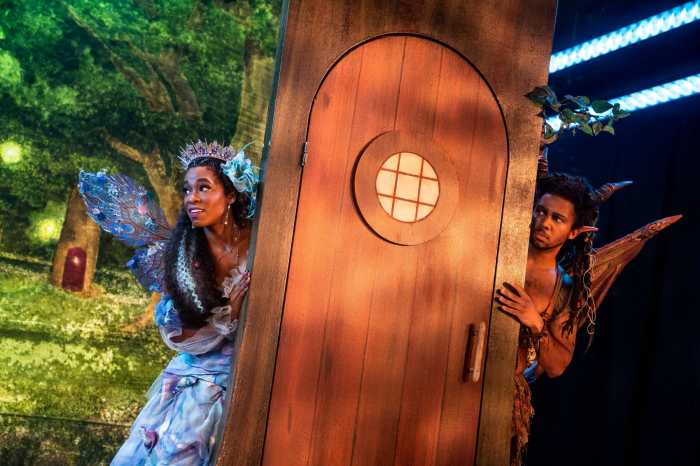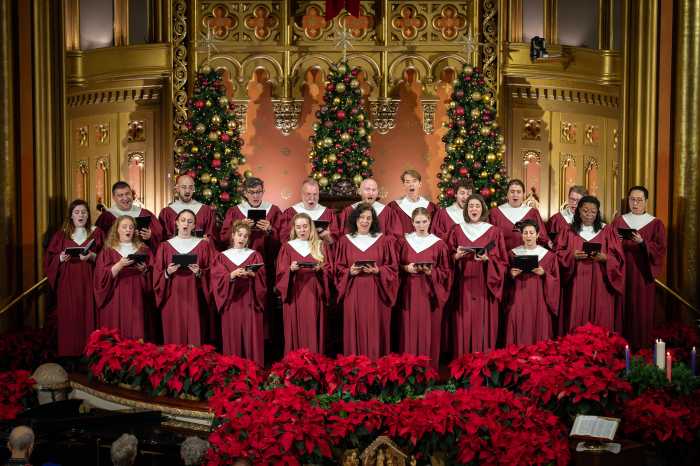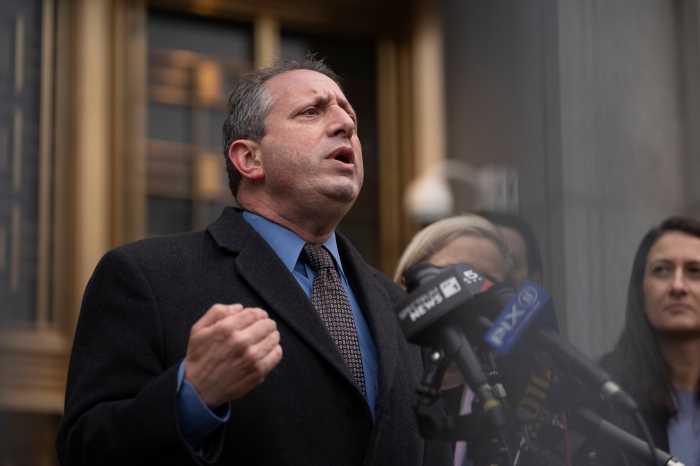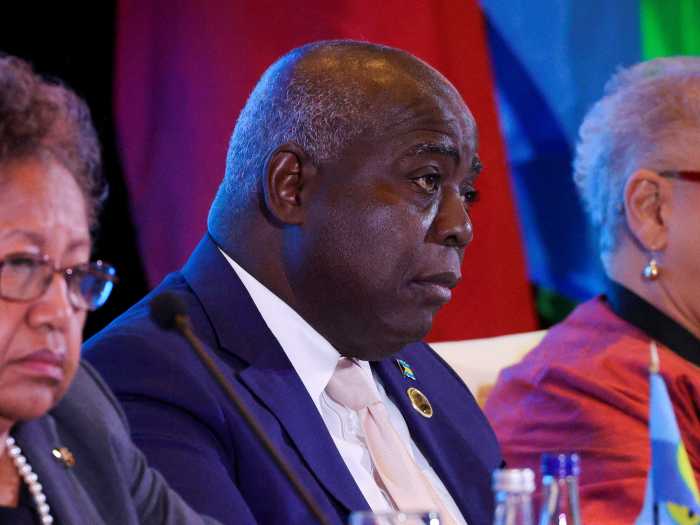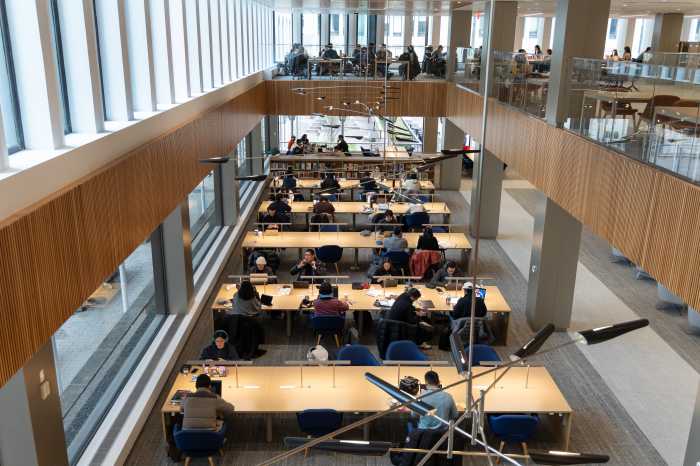It has been said that on any given day, somewhere in the world, a performance of Thornton Wilder’s “Our Town” is being staged. Famously set in the fictional town of Grover’s Corners, New Hampshire at the dawn of the 20th Century, the metatheatrical drama, which won the Pulitzer in 1938, is a timeless meditation on universal themes of love, beauty, mortality, and banality.
This month, there are two comic riffs on the enduring American classic on stages in New York City with a distinct queer bent. Rather than faithful parodies, they employ “Our Town” as a jumping off point, yet each lands differently.
“The Village, a Disco Musical!” is a witty, charmingly erratic, dance-filled romp that borrows liberally from “Our Town.” Like the original, the piece relies on patchy, episodic narrative and minimal scenery, meant to stir the imagination. The proceedings are led by a “stage manager” (Glace Chase) who delivers wry commentary directly to the audience. In this version, however, she holds a mic and serves as emcee.
The fourth wall, as it happens, was already broken pre-show, when the scantily clad go-go boys gyrating onstage offered vodka shots and Starburst candies to eager theatergoers.
The story is transferred to Greenwich Village, where a motley band of queer characters go about their daily machinations, living life to the hilt. The year is 1979, when disco was at its peak, and dancing and drugging and sex were a way of life. The dance vignettes, choreographed by Robin Carrigan, inject a blast of sensual energy into the proceedings.
Directed with aplomb by Adam Pivirotto, the piece centers on a musclebound bleach-blond hustler named Trade (Antony Cherrie), who has brought home Steven (Ever Chavez), a plucky NYU student after a night out on the town. The overdecorated apartment actually belongs to Old George (Chuck Blasius), the sexagenarian sugar daddy who gladly puts up with Trade’s raunchy exploits (as embodied by the impossibly luscious Cherrie, who wouldn’t?). It’s no coincidence that George is the name of the main character in “Our Town.”
Other Village denizens are gamely portrayed by Ashley Chavonne, Eileen Dover, Valton Jackson, Antwon LeMonte, and Richard Shieffer.
The piece is written by none other than Nora Burns, the demented mastermind behind Unitard and The Nellie Olsens. The dialogue is spiked with snarky jokes and keen insights, and is sprinkled with names of actual historic queer haunts like Julius’, Tiffany’s Diner, Rounds, Townhouse, Ninth Circle, and Studio 54.
When Old George insists Trade join him at the opera, the reluctant boytoy replies, “You can lead a whore to culture, but you can’t make her think.” A running gag involves how the couple met. Trade says they met online, which stupefies his friends. “On line to get a drink at the Anvil,” he clarifies.
Burns makes a brilliantly bizarre appearance as Junkie Jane, who stands slumped in a drugged-out stupor. Cherrie and Chavez have unusually ardent chemistry. When they kiss full-on — which is often — sparks fly.
The closest the work gets to “Our Town” is towards the end, when the mood takes a somber turn. The action flash-forwards several years, after certain characters have died, some as a result of AIDS complications. That does not, however, stop them from speaking their minds.
Trade’s final words from the grave perfectly capture the essence of the original. “Goodbye to lovers and tricks. Good-bye to all-night diners and $1.99 breakfast specials after a night of dancing…Do any human beings ever appreciate life while they live it, every minute?”
Less successful is “Our Town, but Wilder,” written and directed by Richard Krevolin, which opens much like a traditional production of the classic. The set is little more than a row of mismatched chairs and a ladder. The Stage Manager (an affable Chris Carver), mirroring Wilder’s language, introduces the play and its diverse, quirky characters who, it must be noted, are nothing like those in the original. He is quick to disclose that he is gay.
The year is 1984 and the town is Irrelevant, Connecticut. The story focuses on a Jewish “sexually confused” student named Bentley Cramer (Ben Elias), who is starring in a production of “Our Town” at his high school. Bentley, we soon realize, is the younger version of the stage manager.
Other townsfolk include Bentley’s stereotypically doting mother (Frances Karagio), the WASP busybody (Anne Nadell), the brash young homophobe (Joseph Monseur), the bumbling principal (Robert Aloi), and the emo rebel (Caitlin Wells). Histrionics abound.
This ambitious production is packed with enough ideas for ten iterations of “Our Town.” Themes range from global warming to the fraying of social fabric to sexual desire. The copious narrative fragments — including a taboo erotic moment between a teacher and student, and a bloody death — are overwhelming. In addition to the queer twist and the Jewish twist, there’s a scene with the ghosts of Oscar Wilde and Thornton Wilder, a character who bursts into song at odd moments, and a clunky musical number based on the Village People’s “YMCA” (modified to “YMJA”). And so much more.
What made the original so affecting was that the plot was as lean as the set design, allowing room for penetrating emotion. Wilder’s message of cherishing the simple pleasures in life before they slip away is nowhere to be found. If the original is a celebration of nostalgia and humanity with a hint of regret, this iteration is supremely cynical, as evidenced by its subtitle “A lamentation for America.”
In one of the more engaging scenes, the characters mount a kind of mutiny, questioning the direction of the play — a nod to Pirandello, a major influence on Wilder. Mrs. Cramer asks pointedly, “What’s with all the monologues?,” noting that dialogue is “snappier.” She has a point. Wilder masterfully balanced monologue with dialogue, whereas this work fails to do so.
Wilder, who never married, enjoyed close relationships with men throughout his life, though he never publicly confirmed his homosexuality. His “Our Town” depicts the marriage of a man and a woman as the bedrock of respectable society. In a way, “The Village, a Disco Musical” and “Our Town, but Wilder” throw open the closet door, injecting a canny queer sensibility into the perennial masterwork.
The Village, a Disco Musical! | Dixon Place, 161A Chrystie St. | $20-$32; dixonplace.org | 60 mins with no intermission
Our Town, but Wilder | Actors’ Temple Theatre, 339 W. 47 St. | $30 – $59; ourtownbutwilder.com | 100 mins with no intermission


